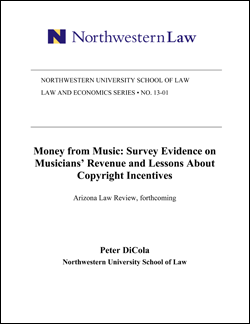Money from Music
Survey Evidence on Musicians’ Revenue and Lessons About Copyright Incentives
Download:
![]() Money from Music (1.2 Mb)
Money from Music (1.2 Mb)
This article is based on an original survey of over 5,000 musicians nationwide. The survey results demonstrate the diversity of the population of musicians, in terms of genre, income bracket, demographics, education, and many other variables. In this article the author focuses on how the mix of revenue sources varies across musicians, especially by genre and income bracket. The author categorizes the different revenue sources in terms of their relationship to copyright law and classifies money from compositions and recordings as directly related to copyright. Other revenue sources, like revenue from live concerts or teaching, are categorized as having either an indirect relationship to copyright law or no relationship. (Session work is categorized as “mixed” because some session work is done for copyrightable recordings but some is for live concerts.)
Using this categorization, the author analyzes which musicians appear to depend directly on copyright for their livelihood. Composers and musicians in the top income brackets depend heavily on revenue that is directly related to copyright protection. But the vast majority of other musicians do not. Although these survey findings cannot resolve whether and how financial incentives matter for creative activity, they can rule out some versions of the incentive theory and make others seem relatively plausible. (These cross-sectional survey data cannot, of course, rule out theories of creativity based on non-financial incentives or theories that are not economic in nature.) For most musicians, copyright does not provide much of a direct financial reward for what they are producing currently. The survey findings are instead consistent with a winner-take-all or superstar model in which copyright motivates musicians through the promise of large rewards in the future in the rare event of wide popularity. This conclusion is not unfamiliar, but this article is the first to support it with empirical evidence on musicians’ revenue.

